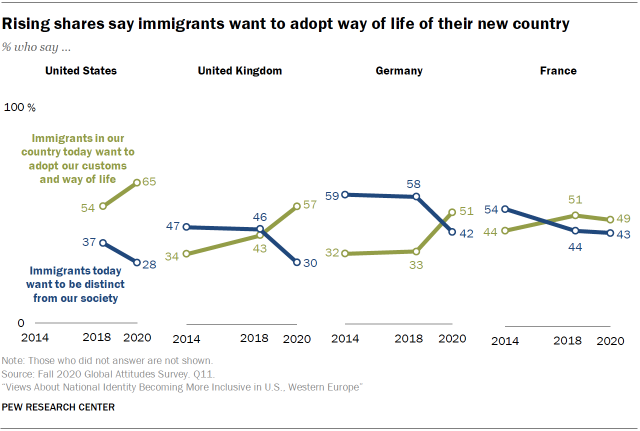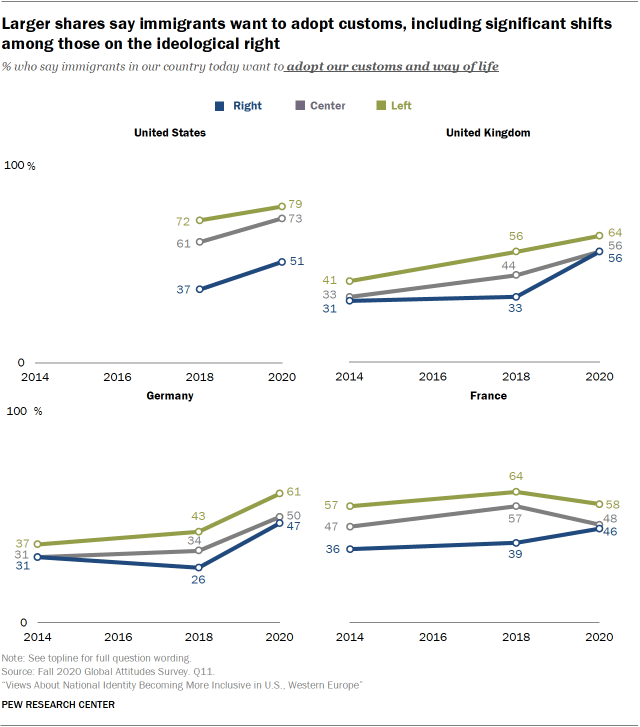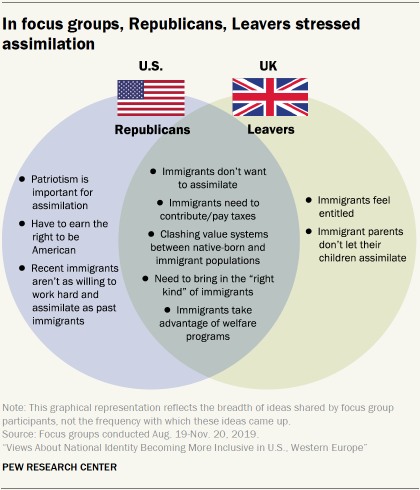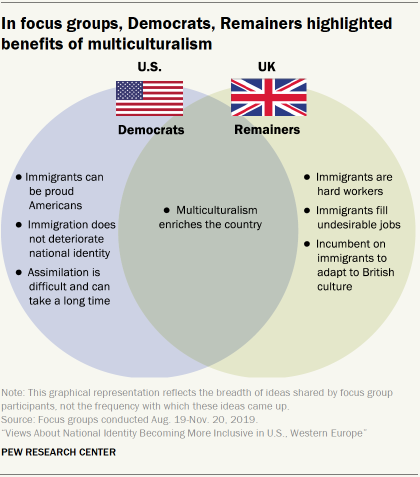The share who say immigrants in their country today want to adopt their customs and way of life has increased significantly since 2014 in the UK, Germany and France (the question was not asked in the U.S. until 2018).
“It’s good to have a mix of different cultures and backgrounds, but I think it can sometimes be negative if … people will come into the country and not learn the language. They’ll close themselves off and they don’t integrate. Then I think that can be a negative.”
–Man, 34, Newcastle, Left Leaver
Attitudes shifted dramatically between 2018 and 2020 in Germany, the UK and the U.S., with the share who say immigrants want to adopt the country’s customs increasing by at least 10 percentage points in each country. In France, attitudes toward immigrants grew more positive from 2014 to 2018 but have stayed relatively stable since then.
Much of the movement in these attitudes has been driven by growing shares of those on the ideological right saying immigrants want to assimilate. For instance, the share who hold this view among those on the ideological right in the UK has increased from 33% to 56% since 2018. Among those on the ideological right in Germany, it has grown from 26% to 47% over the same period.
Republicans in the U.S. and Leavers in the UK point to importance of assimilation; Democrats and Remainers see benefits in multiculturalism
When discussing what it takes to be American or British, focus group participants in the U.S. and the UK often pointed to the importance of assimilation. With both countries experiencing rising rates of foreign-born residents, the topic was discussed at length in many groups. On the whole, this conversation was concentrated in the Leaver and Republican groups, though the topic was raised in many groups.
In both Leaver and Republican groups, one of the most prominent themes was the idea that immigrants need to contribute to society in order to be accepted. The exact form of these contributions differed, but participants focused on the importance of working and paying taxes. Both types of groups also focused on the necessity of bringing in the “right kind” of immigrants, i.e., well-educated and wealthy immigrants instead of immigrants who would take advantage of welfare programs. Leavers and Republicans also saw issues with immigrants refusing to assimilate and retaining their value systems from their home countries.
Many said that immigrants would not even make an attempt to assimilate, refusing to learn English, living in insular communities and retaining value systems from their home countries.
Focus group participants in the UK frequently brought up instances where they felt like they were in the cultural minority. One London group noted that “the minute [they] get on the tube, [they] feel like [they’re] in a foreign land” and described it as a “quite hostile environment.” Leavers particularly focused on feelings of entitlement among immigrants, as well as instances of immigrant parents refusing to let their children assimilate, noting that sometimes it seems like immigrants “don’t want to integrate their kids” in school.
Republicans characterized assimilation somewhat differently than Leavers, with a focus on the importance of patriotism as part of assimilation. One group in Pittsburgh went so far as to say “you have to love America to be an American,” stressing that even those born in the U.S. who criticize the country are then not “true Americans.”
Remainers, Democrats and some independents in the U.S. also discussed assimilation, but rather than focusing on cultural differences that separate immigrants from the dominant native-born culture, they asserted that multiculturalism is the dominant culture and that assimilation itself is unnecessary. Indeed, many of these groups were extremely positive about how multiculturalism enriches the national culture. One Seattle man argued that “diversity gives us many, many more points of view, which can only make us stronger, more reasonable and more tolerant.”
Remainers tended to focus on the benefits that immigrants can bring in terms of being hard workers that fill “loads of jobs that [their] parents didn’t want.” One Birmingham man pushed back on the idea of complaining about immigrants: “As long as you are giving back and working, how can anyone complain?” Some Remainers still asserted that it was incumbent on immigrants to adopt British culture and learn the language.
Democrats and independents in the U.S. often brought up assimilation in the context of national identity, arguing that rather than “deteriorating” national identity, immigration could strengthen the country. Other participants noted that the immigration and assimilation process can be long and emotionally taxing but that does not mean immigrants cannot be proud Americans.
“Who’s the arbiter for what is ‘American?’ You have to like a hot dog and wear a baseball hat to be an American? It goes back to what I said about our culture. It’s from all over.”
–Man, 35, Pittsburgh, Independent
“Back then, [immigrants from other countries] came and they learned our language. They followed our laws, they became Americans. Now I feel people come and they just want to do whatever they want to do just because.”
–Woman, 52, Seattle, Republican
Among Republicans and Republican-leaning independents in the U.S., the share who say immigrants want to assimilate has increased significantly from 31% in 2018 to 53% in 2020, while opinions among Democrats and leaners have stayed stable at around three quarters holding that view. (Previous research has shown shifts in Republican views drove an increase in warm feelings toward immigrants, though attitudes toward immigrants assimilating remained largely stable among Republicans through 2018.) In the UK, Conservative Party supporters and Labour Party supporters alike have shown similar movement in attitudes toward immigrants.






